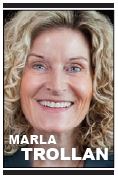By Marla Trollan
Since 1987, the U.S. Small Business Administration has celebrated Women’s History Month to recognize the role women entrepreneurs have in building and strengthening our local and national economies. Women have transformed the face of entrepreneurship across America in both urban and rural communities. This has been especially true while our nation confronts the challenges of the COVID-19 pandemic.
Women entrepreneurs continue to play a greater role in creating new jobs and economic activity across the country. According to the National Association of Women Business Owners, nearly 12 million businesses are owned by women, generating $1.7 trillion in sales, and employing over 9 million people. Together, these businesses represent one of the fastest-growing sectors of our economy.
In Utah alone, during fiscal year 2020, women-owned businesses received 2348 loans for $238,236,920, both through traditional SBA programs and the Paycheck Protection Program. Women-owned businesses (WOBs) also received 85 loans through the 504 Loan Program totaling $50,650,000. The 504 Program helps businesses build space or buy equipment.
So far in FY21, WOBs in Utah have received 1,701 7(a) loans for $115,513,815 and 50 504 loans for $24,274,000. The FY20 7(a) number of loans is a 508 percent increase over FY19 and 186 percent increase in dollar amount. According to the American Express Report on the Status of Women-Owned Businesses, there are an estimated 89,000 women-owned (majority-owned and controlled) companies in Utah.
Even given this tremendous growth, women continue to face challenges and obstacles that men do not when starting and growing a business. According to a recent study by the SBA’s Office of Advocacy, women-owned firms are overrepresented in industries related to domestic services which tend to have low growth potential. Also, women are more likely than men to run home-based businesses, and women with children were more likely to have a home-based business.
The study also found that men with children were less likely to operate their businesses from home. Women with children at home were less likely to operate in high-growth industries, while the opposite was true for men. Women with college degrees were more likely to be in high-growth industries like construction and accounting/booking services. Men in high-growth industries tended to have proportionately fewer college degrees. Finally, racial minorities own more businesses in women-concentrated industries such as beauty salons and childcare services.
To level the playing field for women entrepreneurs, the SBA is administering vital economic aid programs to provide a lifeline to millions of American small businesses, nonprofits, and their employees. The Paycheck Protection Program, COVID-19 Economic Injury Disaster Loans, Targeted EIDL Advance, Shuttered Venue Operators Grants and debt relief for existing agency borrowers are part of the nation’s largest economic relief efforts ever.
The SBA continues to support initiatives that benefit the women’s business community to address barriers to access to capital, business training, government contracts and disaster recovery assistance. This is especially true in minority communities where the agency has called on its lending partners to redouble efforts to assist eligible borrowers. SBA is working to ensure economic aid programs are accessible to all eligible entities, including those hit hardest, while protecting program integrity and ensuring that aid is released as quickly as possible.
Another way SBA assists women entrepreneurs is through its more than 100 Women’s Business Centers nationwide which assist women in starting and growing small businesses. These centers provide a full range of services for women entrepreneurs at all stages of planning, implementation and growth.
In Utah there are two locations of Women’s Business Centers, one in Salt Lake City and one located in Cedar City. During fiscal year 2020, the Utah WBCs counseled 264 clients, held 427 counseling sessions, hosted 211 hours of training and counted 1,164 total training attendees.
For those interested in contracting with the federal government, the Women-Owned Business Certification helps equalize the procurement process for women business owners, as the government limits competition for certain contracts to businesses certified as women-owned. This initiative compliments SBA’s 8(a) program to assist socially and economically disadvantaged business owners in accessing federal contracts.
Other mentoring programs include SCORE, a network of thousands of volunteer business counselors around the country who mentor and educate smallbusiness owners, and our statewide network of 14 Utah Small Business Development Centers.
At the SBA, our role is to support all entrepreneurs as they scale-up their business and recover from today’s challenges. This is especially true as we celebrate national Women’s History Month.
For more information on SBA’s programs and services please visit www.sba.gov, follow us on Twitter @SBA_Utah, and subscribe to our e-newsletter at www.sba.gov/updates.
Marla Trollan is the Utah district director for the U.S. Small Business Administration.








